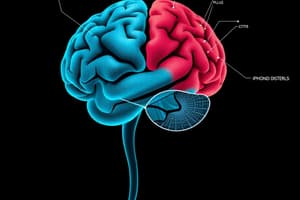Podcast
Questions and Answers
Mental disorders are grouped into various classes based on?
Mental disorders are grouped into various classes based on?
phenomenological characteristics
What is the purpose of the classification of categories?
What is the purpose of the classification of categories?
to improve treatment and prevention efforts
Diagnosis of mental disorders is based on?
Diagnosis of mental disorders is based on?
clinical observations of signs and symptoms agreed upon by psychiatrists and other mental health professionals
What is the purpose of the system of classification of psychiatric diagnoses?
What is the purpose of the system of classification of psychiatric diagnoses?
What is the DSM?
What is the DSM?
What does the ICD stand for?
What does the ICD stand for?
What is the DSM Descriptive approach?
What is the DSM Descriptive approach?
What are DSM Diagnostic criteria?
What are DSM Diagnostic criteria?
What does the DSM Systematic description involve?
What does the DSM Systematic description involve?
The order of classifications includes disorders such as _________.
The order of classifications includes disorders such as _________.
What is a fundamental concept in Occupational Therapy?
What is a fundamental concept in Occupational Therapy?
What are the core values of Occupational Therapy?
What are the core values of Occupational Therapy?
What do philosophical assumptions in Occupational Therapy guide?
What do philosophical assumptions in Occupational Therapy guide?
Person-first language is an assumption in OT that encourages labeling individuals based on their conditions.
Person-first language is an assumption in OT that encourages labeling individuals based on their conditions.
What does OTPFW III represent?
What does OTPFW III represent?
OTPFW III includes 5 domains: occupations, client factors, performance skills, performance patterns, and ________.
OTPFW III includes 5 domains: occupations, client factors, performance skills, performance patterns, and ________.
Study Notes
DSM 5 and ICD Classifications Overview
- Mental disorders are classified based on phenomenological characteristics.
- Classification aims to enhance treatment and prevention efforts.
Diagnosis of Mental Disorders
- Diagnosis relies on clinical observations of signs and symptoms, organized into disorders.
- Consensus is achieved among psychiatrists and mental health professionals.
Purpose of Psychiatric Classification
- Differentiates between various diagnoses.
- Provides a standard language for communication in psychiatry.
- Encourages ongoing research into unexplained causes of mental disorders.
Diagnostic and Statistical Manual of Mental Disorders (DSM)
- Published by the American Psychiatric Association, serving as the official psychiatric coding system in the US.
- First published in 2013, structured along the lifespan.
- Functions as a manual for nosology, not for direct diagnosis.
- Contains 22 major categories, encompassing over 150 distinct mental illnesses.
International Classification of Diseases (ICD)
- Developed by the World Health Organization, adopted globally.
- Ensures uniformity in diagnostic coding for statistical reporting, both nationally and internationally.
- Mental health providers in the US are required to use ICD-10 codes for reporting.
- New coding guidelines were introduced in 2017 to facilitate occupational therapy evaluations.
DSM Classification Approach
- Utilizes an atheoretical, descriptive method focusing on clinical features.
- Each disorder has specified diagnostic criteria outlining required features for diagnosis.
- Ensures reliability in the diagnostic process.
Systematic Description of DSM
- Provides a comprehensive outline of associated features, including cultural and demographic factors.
- Avoids theoretical management or treatment recommendations.
Order of Classifications in DSM
- Classification covers a wide range of disorders including neurodevelopmental disorders, mood disorders, anxiety disorders, and personality disorders, among others.
Occupational Therapy and Clinical Reasoning
- Clinical reasoning involves gathering and analyzing information to enhance daily functioning.
- Establishes a prioritized list of anticipated problems to guide treatment.
Core Values in Occupational Therapy
- Fundamental values include altruism, dignity, equality, freedom, justice, truth, and prudence.
Philosophical Assumptions of Occupational Therapy
- Client-centered therapy is guided by assumptions that focus on meeting the needs of both clients and society.
- Emphasizes understanding the client's context and individual needs.
Person-First Philosophical Assumption
- Encourages avoiding labels when describing individuals with diseases or conditions, promoting dignity and respect.
Occupational Therapy Practice Framework (OTPFW) III
- Provides a standardized language defining the occupational therapy domain of concern.
- Describes how therapy facilitates engagement and participation in life activities.
Five Domains of the OTPFW III
- The framework includes five domains: occupations, client factors, performance skills, performance patterns, and additional unspecified components.
Studying That Suits You
Use AI to generate personalized quizzes and flashcards to suit your learning preferences.
Description
Test your knowledge on the DSM 5 and ICD classifications with these flashcards. Explore the groupings of mental disorders based on phenomenological characteristics and understand the purpose behind these classifications for treatment and prevention efforts.




